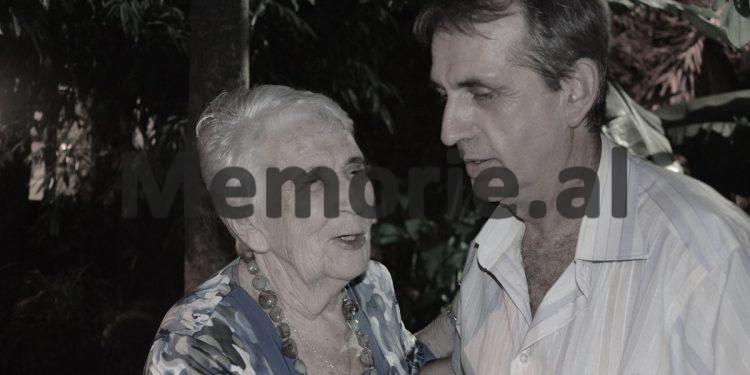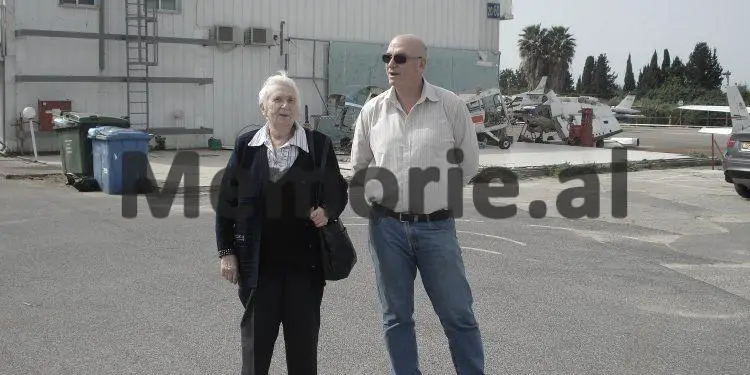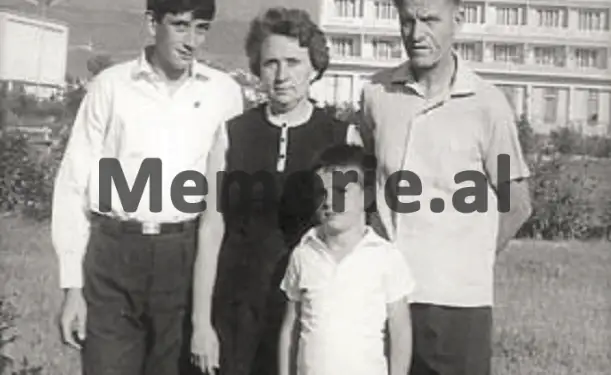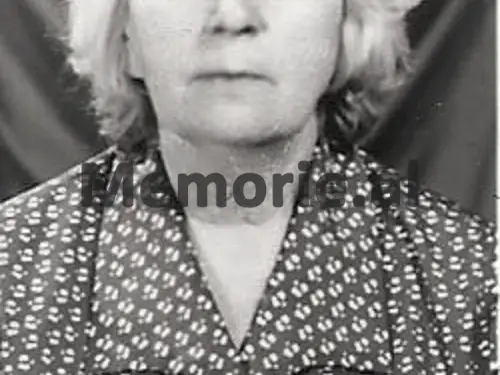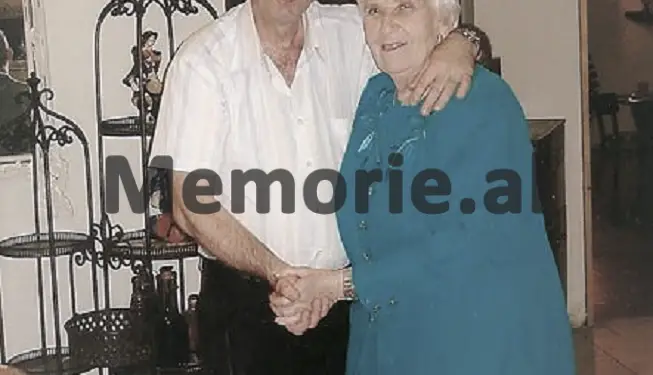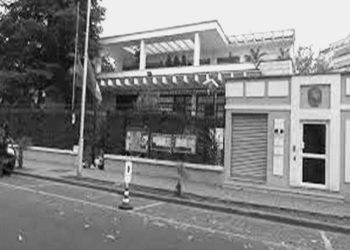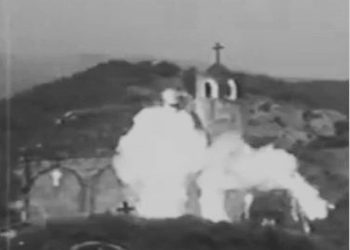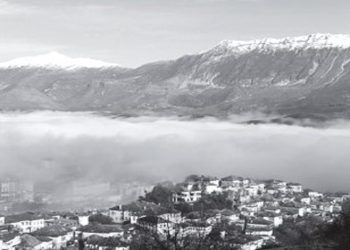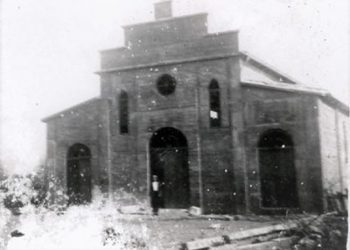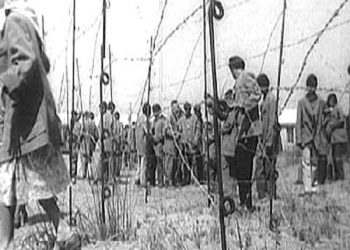By Taisa Batkina Pine
Part twelve
Memorie.al/publishes the unknown story of the Russian Taisa Batkina (Pine), originally from Tula, Russia, the third child of a very poor rural family, who was left an orphan at a very young age, after her father lost her life while working in one of the coal galleries on the outskirts of Tula, where he worked as a miner (shortly after escaping arrest, accused of “supporting the enemies of the people”) and she grew up with difficulty great economic, as their city continued to be under the bombardment of German forces, which had reached as far as near Kursk. Taisa graduated from the Faculty of Chemistry, near the ‘Lomonosov’ University of Moscow, where she met and married the Albanian student, Gaqo Pisha, originally from the city of Korça, who at that time was studying at the Faculty of Philosophy in Moscow and both together in 1957, they returned to Albania, together with their newborn son, Sasha, and began life in the city of Tirana, where Taisa was appointed as a professor of Chemistry at the State University of Tirana, while Gaqo, in the chair of Marxism- where they worked until 1976, when the State Security arrested Taisa Batkina on fabricated charges, accusing her of being a “Soviet KGB agent” and sentencing her to 16 years in political prison, which she suffered. in the “Women’s Prison” in the city “Stalin”, from where she was released in 1986, while her husband, Gaqo Pisha, had died in 1983, from a serious illness. The tragic story of Taisa Batkina (Pine), in the inhuman camps and prisons of Enver Hoxha’s communist regime, where she spent a decade of her life, along with many compatriots from the former Soviet Union, or other Eastern European countries, comes through her memories, published in a book entitled “We hoped and survived”, memories which, her son, Aleksandër Pisha, kindly offered her for publication, in Memorie.al
We hoped and survived
I dedicate it to the bright memory of my husband, GAQO PISHA
This is a book of memories. In it I want to tell about my life and that of my friends, Soviet women, who tried prison for several years just because they got the courage and got married and linked their fate with that of Albanian students. The prison was part of the great GULAG in the small Balkan country, Albania, where for many years the bloody communist regime of Enver Hoxha ruled, who was a loyal student of Stalin and a follower of his cause.
Through this book I would like everyone to learn about the inhuman trials we experienced and the horrible years we spent in Albanian prisons, just because… we fell in love! And let no one ever forget what totalitarianism, despotism is and what the consequences of this system are.
Continued from the previous issue
Auto cinema in the camp, with the same movies!
Only the guards could open it. There was another entertainment in the camp. About once every two months the cinema car came, they also brought a tape recorder with dance music. Both were accompanied by Sotir, a weak, tall, and talkative boy. He was eagerly awaited, especially those of the ordinary corps, who awaited his arrival with enthusiastic shouts. Once all the brigades were working on the sides of the hills, from where the road to the camp seemed. Suddenly on the slopes of the hills were heard screams, screams, cheers. We were not understanding anything, we turned our heads and noticed that all the brigades had their eyes fixed on one point; they had spotted Sotir’s car and the hills resounded with shouts: “Sotir! Sotiri! ” They all started working with double the power, finished the rate quickly, lined up in a hurry, and ran to the camp. We barely followed them. Luckily this time the work was not too far away. Even after we arrived, they did everything in a hurry: they quickly left, ate, decorated and hurried to the canteen, where the dancing took place. In the evening they all took from a bench in their hands, some large stone and relaxed in the courtyard square. (In winter and in rainy weather, they gathered in the large ordinary canteen). We hung a sheet on the wall and stared at the screen. They brought us the same old movies, even though we had seen them several times; we continued to watch them with the same interest. The most frequent and popular movie was “Age of Love”, with Lolita Tores. There were no other fun activities.
Our animals
The camp was not far from the village and from there dogs and cats came to us. The dog had a lot. We gave to eat these stray dogs, eternally hungry. Bedrije Havale dealt with them more than the others (I will write about him in more detail in the next chapter). Bedria was a woman, wicked, rude; her only positive quality was her love for animals, so we nicknamed her “Cat Mother”. I do not know what evil the dogs did to our command, but one not-so-gloomy day, he ordered the dogs to be killed. The women wept, begging for mercy from the poor animals, but in vain. The massacre of dogs began. They hit them with sticks, strangled them in all in our eyes. The screams of poor animals, the screams and cries of imprisoned women could be heard. Sure, all of this should have been planned to intimidate us, but even the guards happily did the job, calling it amusement. They killed many dogs, and those who managed to escape were no longer seen in the camp, they were terrified. Cats were more fortunate. Even though they fell, chased them, we raised and hid the cats. We collected kittens. Nadja and Qerimen had a cat; they called her ‘Suzi’. They loved him very much and the cat responded with love. One day Suzi lost, we felt sorry; we suffered so much her disappearance. Women are used to caring for children, for the family. We had no one to take care of here, so we loved the cats. The days of punishment were spent with ordinary work, and caring for cats was called something common, learned, and reminiscent of home. Among our cats we had a special, main one, which we called “Wild Cat”. She was cunning and clever, refusing to let anyone approach her. She was the wonderful mother, the great-grandmother of all the cats in the camp. Once all the newborn kittens disappeared. For a long time she wandered around, meowing, looking for her little ones. He then hid the puppies and brought them to the camp as they grew up. Someone stoned him one day and pulled out his shoulder bone. With three legs she barely reached the camp for help. But only Nadiren, the peasant girl, who knew how to deal with animals, agreed to approach him and she put his bone in place. How he loved kittens and taught them all sorts of tricks!
I mentioned Ramadan, the wicked guardian, who kicked a cat in front of our eyes. We decided to rescue the cats, we told the driver of the car, who was bringing food to the camp, to take a bag of cats and drop them as far away from the camp as possible, so that they would not return. We agreed with the driver, we gathered all the cats in a bag, we could not find only the cat named ‘Rustem’. We later learned that the clever cat had realized something was happening and was hiding. When the danger passed, he came back to the canteen. He became my cat and Vola. He was a really smart and careful cat. In the canteen he moved only along the walls under the tables, so that no one would step on him, he recognized all the malefactors in the face and hid when they entered the canteen. One day he stepped on the barbed wire and scratched his foot badly. We took him to the infirmary and treated his leg. The next day he went to the three-legged infirmary on his own. Then he too disappeared, perhaps killed by the guards, or the children of the village. We felt very, very sorry.
I want to write once again about the human ability to learn, to adapt. We had nothing, so we started looking. We found old, printed pots, aluminum, tailless pans, bowls, and spoons. We carefully cleaned, corrected, and directed all these. The tails of the pans were sometimes made by the camp blacksmith, after we prayed for a few days… One of the women, who was about to be released, gave us a cauldron. In it we boiled clothes. Later we covered the water pots with plastic and the water was heated in the sun. We joked that our main bazaar, the main supply base, was garbage, a large pile of rubbish at the end of the garden. There you could find a lot of necessary things; they all came in handy as we adapted them. It is time to remind you that poverty in Albania was extreme, shocking. The children of the village hid somewhere around the garbage and patiently waited for the camp gate to open to take out the garbage. There was a lot of garbage, some big bins. As we left, the children would sneeze and pick up everything they could find, from old pens or pens to rags.
First meeting at camp
It was a hot Sunday in August 1979. Luckily, we had a day off that day. From morning all the women took care of their chores, who washed, who patched. More people came around to the canteen and the kitchen. Everyone was trying to cook something… on Sunday they had to eat a little better, but also for the next week something had to be prepared, to take with them to work. Usually these were meatballs, boiled potatoes, and roasted leeks. Sunday was also a day of meetings… everyone was waiting, hoping. I was not expecting anyone. I had no meetings. Who could come to me? My seriously ill husband, almost paralyzed? Costa? He was still small. Sasha was a soldier. You were not allowed to leave the ward. I had not received any letters from home and did not know anything about them, except that they continued to live in Tirana. Sometimes they would send me some money, or a small package of food. I knew they were taking the last crumbs out of their mouths because they only lived on their husband’s meager pension. I wrote to them, begging them not to send me anything, but it was in vain. Now let’s get back to that Sunday. Suddenly Marieta, our courier, entered the canteen. Everyone freezes in anticipation. The courier was a responsible post in our administration of prisoners. It was the prisoners’ connection to the command. She always brought us the news, good and bad. The bad ones were: calls to the command, to the Operative, or calls to work, and good ones – when he calls for an appointment. Marieta asked: “Do you have Alexandra Pisha here? They came to the meeting”! “No, I am Taisa Pisha,” I replied. I was sure it was not my meeting, I knew there was no one to come to me and I continued to do my chores, I was cooking something. But suddenly Marieta smiled again: “Come on, have a date”! (Sasha, out of emotion, had mentioned her name instead of mine). It became a bit of a mess. One of my friends (it seems to me Ina Shahe) ran to the service officer to beg him to let me have a long meeting.
They started to choose what to wear. Only prison clothing was allowed. I only had work clothes. Painted pants, sunburned and jackets… even worse…! My friends started to change me, they offered me something different pants, a better blouse, and they gave me a big bag of food. I finally got dressed, combed…! Arrest, pre-trial detention, loneliness, trial and hard work in the camp had made even the last strand of my once very beautiful hair gray. I was losing 30 pounds. I had not seen Sasha for 3 years. I ran to the gate, sat down, and waited, with my eyes directed to where the visitors were waiting for the meeting to come. But it was far away and I did not notice anything. Finally it was my turn, they let me out the gate and I spotted my son, on the way to the meeting house, my dear son, my little one, who had always been for me not only a son, but also a friend, friend, counselor and support. He had changed a lot during these years, he was weakened, and he became manly. He had suffered a lot. What a meeting he was! Joy and sorrow together! We hugged and cried. Rather, Sasha cried. I held back the tears, I did not want to add to his suffering, but I did not have any more tears, they were dry. Sasha kept repeating: “Mom, what do you have? What have they done to you? He spoke to me in Russian and I replied, “Work in the fields, hunger.” At that moment, the guard shouted: “Do not speak Russian, only Albanian!” and hearkened to hear what we said. We sat down. I was shaking, not crying. Sasha held my hands in hers, smoothed them, and occasionally wiped away tears. We both tried to calm each other down. Sasha told me that he had completed his military service, worked in the foundry, also told me about the condition of his sick father. He was very serious, having been battling Parkinson’s disease for 12 years. My arrest, everything that followed later, had greatly aggravated his condition. “Costa has also started generic work, after a month he will come to meet you”, – continued Sasha. – “Are you?! So small? How will it come alone? Do not leave him! – I shouted. I was always like an idiot; I always wanted to cover them, to protect my boys. “How small, mom?! The boy is 17 years old”! – Sasha greeted me. Yes… 17 years old! And it seemed to me that he was still small as then, when I was so violently detached from him. The clock flew very fast. “Time is running out! Say hello! Get away! ” We got up, hugged. With great difficulty I broke away from Sasha. He goes out. I took the bags and brooded towards the barbed wire. What happiness I saw the boy and how bad we cannot be together! The door opened, let me in, and closed behind me again. My friends at the top of the stairs caught my eye… they cried and smiled at the same time…
After a month Costa came. He had grown up, he had changed a lot, and at first I did not know him. Handsome, manly, with carefully combed hair, he wore a yellow blouse. It was a very hot day, Costa was very tired, and he had walked 20 kilometers, even loaded. That day they let us talk and unwind for only half an hour. Meetings with close people were always difficult, both morally and physically. No cars passed near our camp, and we had to walk many miles from the highway, even with a load on our shoulders. At the village shop, people who came to meet the prisoners were not allowed to buy. Thus, my boys started coming regularly, caring very touchingly for me. The meetings happened to be different, both hilarious and sad. Anyway, as long as I live I will be grateful to my golden husband and dear boys, for everything they did for me, for their care, for their kindness, selflessness and love, which helped me survive in the most difficult time. I had another meeting, about which I want to tell.
It was a cold winter day; I was sitting in the yard. I had thrown the prisoner’s cap on my arms… I was in the same state of mind. Meetings were banned in the camp at that time… I do not remember the reason. Suddenly I was called to the gate, but he did not tell me anything about the meeting. I left very worried. I did not know what they wanted from me. Suddenly I saw at the gate the nephew of the man, whom I had loved very much, he often came to our house, especially when he was studying in Tirana. He worked as an agronomist in the north. I was surprised; I did not expect to see him here. Then coming to meet us was real heroism. They left us only 15 minutes to talk on both sides of the fence very little, but for us it was fun. I learned that meetings were allowed that day, but we did not know our meeting was the first for that day. Only after I was released did I learn that he had had a meeting of agronomists not far from our camp, found the right time, and came on foot to the camp to meet with me. That is why I always remember this meeting with gratitude. The meetings were the most important, most joyful events not only for those who received visitors, but also for their friends. We enjoyed, sitting on the stairs, or in the yard watching from the street. We felt happy when we saw people from outside, familiar faces. Meetings were often stopped… usually a month before the holidays, or quarantined…! It happened several times that cholera patients were found in the village and, since we were getting water from the same source, they did general disinfection in the camp; so much chlorine was thrown into the water that it was not drinkable. And, of course, they stopped the meetings. But we did not know, people came from afar and came back, without meeting. Well, they accepted the food…! Sometimes they allowed us special, long meetings with mothers, sisters, and children. Meetings were held in that small lodge near the camp gate. There, after a thorough search, people were locked up from 5-6 pm to 6 am, shortly before the appeal. The lucky ones were preparing for the meeting a few days; cooked, baked. They went to the meeting, after taking with them the delicious dinner and returned in the morning with empty dishes and bags of food, happy, sleepy. Those who worked in the fields hurriedly changed and ran in line to get to work.
Medicine in the camp
Hospital we had a nurse in the camp, a visiting room and two bedrooms, but we did not have a doctor for a long time. Sometimes the doctor would come from the nearby village, hastily visit the sick, and disappear again for a long time. Only the last 3-4 years of my term in the camp, brought a doctor, a young girl, who had just finished her studies. She came to us regularly once in 1-2 weeks. After her arrival the medical service in the camp became more professional. But, both before the doctor arrived and after her appointment, all the medicine in the camp was run by the nurses who were also prisoners. Among them were all sorts of good and bad, ladies and gentlemen, but also just fools, who did not understand medicine at all. Now I cannot remember them all. They carried iodine, gauze, bandages, some medicines, with which they cured every disease. Subordinate to them were also two nurses, who accompanied the brigades to work. It all depended on the nurses: they could fire you in the field for a day or two (which was very important), they were present when the packages were checked, and they even had the right to return them. During the checks, they might throw your belongings on the ground if they felt that they violated the rules in the camp. Many other things depended on them. They knew how to use their power. Once my boys had put some eggs in the package. Along the way an egg was broken and broken Just that. But the nurse threw away the whole package. I made a scandal, until I managed to get some very fresh, unbroken and so necessary food for us, which my sons, had bought with the last pennies, removing from the mouth of himself and his sick father.
Packages were usually too late. Albania is a small country, the packages came quickly, but then they stayed in the post office for weeks, until the camp sent a car to pick them up. The car was rarely driven. Fruits often broke down and you could only get seeds instead. Very rarely a medical commission came to the camp. The prisoners waited impatiently for him. The members of the commission enjoyed great power and rights. You could be fired from a field job, or given a recommendation for easy work, assigned a special meal, hospitalized, etc., etc. The prison hospital was to us like paradise on earth. There was only one prison hospital in the whole country; his corpses surrounded by barbed wire were located in the territory of the largest hospital in Tirana. It was great luck to be hospitalized. They usually waited for months for the queue and the transport. If you were lucky and hospitalized, you could hope to have tests, x-rays, to see a specialist. There were doctors of all specialties who were allowed to enter the prison hospital. I was lucky enough to be hospitalized twice. For the first time during the investigation, when a kind of erysipelas was slandered and I was taken to hospital. Moving from the filthy cell with a mattress filled with rotten straw, straight to the floor, to the clean room, to the bed, to the sheets… a real miracle! Let me be alone, let the door be locked with a latch and lock, as in a cell, but it was quiet, no one shouted, no one called the investigator, no one beat you. Even the food was normal. And, the main room had windows… It was with bars and wire mesh, but it was! The window went out into the yard, where green grass grew, where pigeons came, and soft pigeons! They were multicolored: white, patchy, grayish, and black with red legs; they roamed the grass, stood on the roof of the adjoining building (a windowless wall and roof), cooed, flew… were free. /Memorie.al




